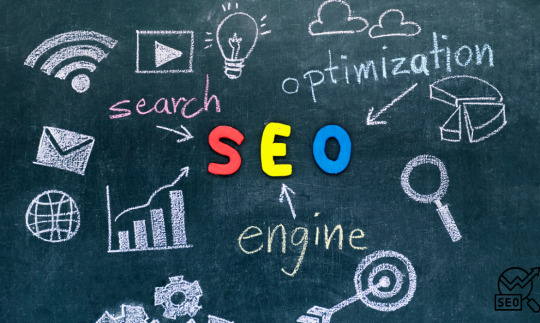At TechTricksLTD, we’re passionate about helping businesses thrive in the digital landscape. Our team of expert marketers, designers, and strategists collaborate to create innovative solutions tailored to your unique needs. From SEO and social media management to content creation and PPC advertising, we leverage cutting-edge techniques to drive measurable results and exceed your expectations. With a focus on creativity, data-driven insights, and client satisfaction, we’re committed to being your trusted partner in navigating the ever-evolving world of digital marketing.visit: https://techtricksltd.com/
Don't wanna be here? Send us removal request.
Text
Off-Page SEO: A Comprehensive Guide to Building Website Authority, Trust, and Higher Rankings
Off-page SEO is a critical component of a successful digital marketing strategy, aimed at improving your website’s authority and trustworthiness by leveraging activities that occur outside of your site. While on-page SEO focuses on optimizing individual elements such as content and meta tags, off-page SEO deals with external factors like backlinks, social signals, brand mentions, and reputation. In this guide, we’ll explore in detail the importance of off-page SEO and the various techniques that can elevate your website’s performance in search engine rankings.
What is Off-Page SEO? Off-page SEO refers to all the actions taken outside your website to improve its ranking in search engine results. These efforts are aimed at showing search engines like Google that your site is popular, authoritative, and trustworthy. It involves activities like:
Link Building Social Media Marketing Guest Posting Influencer Outreach Online Reviews & Reputation Management Brand Mentions Content Distribution on third-party platforms These external signals help search engines assess the credibility of your site and its relevance to search queries.
The Importance of Off-Page SEO Off-page SEO is crucial because it tells search engines how other sites and users perceive your website. Here are the key reasons why it plays a pivotal role in SEO strategy:
Domain Authority & Trustworthiness Google and other search engines use off-page factors like backlinks to determine the domain authority (DA) of a website. High-quality backlinks from reputable sites signal that your site is credible and trustworthy. Search engines rely on these indicators to rank your site higher in search results. Improved Rankings Off-page SEO, especially link building, is one of the strongest factors influencing your ranking position. Google’s algorithm, for example, heavily factors in PageRank, which measures the quality and quantity of links pointing to a website. Increased Organic Traffic A higher ranking leads to increased visibility in search results, which can drive more organic traffic. Moreover, off-page activities like content marketing and social media engagement also generate direct traffic from external platforms. Brand Awareness and Credibility Off-page SEO not only boosts your search rankings but also contributes to brand awareness. When your website is mentioned on reputable blogs, news outlets, or social platforms, it fosters trust and familiarity among your audience. Long-Term Sustainability On-page SEO tactics can bring short-term results, but off-page SEO ensures long-term success by establishing a solid reputation for your website. A website with strong off-page SEO is more resilient to changes in search engine algorithms. Key Off-Page SEO Strategies Link BuildingLink building remains the most influential off-page SEO strategy. Search engines consider links as “votes” for your website, and quality backlinks act as endorsements from other websites. Here’s a breakdown of key link-building strategies: Natural Links: Earned without any direct effort. For example, when someone finds your content useful and links to it naturally. Manual Links: Acquired through deliberate outreach, such as guest blogging, submitting content to directories, or influencer collaboration. Self-Created Links: Links you create yourself, such as in comments or forum profiles, though these are not very effective and can lead to penalties if misused. Focus on Quality, Not Quantity: A single backlink from an authoritative website like Forbes, Huffington Post, or university sites is far more valuable than hundreds of low-quality links. Search engines prioritize quality backlinks that come from trusted and relevant sources.Anchor Text Optimization: The clickable text in a hyperlink is called anchor text, and optimizing this text with relevant keywords can provide context to search engines about the content being linked. Guest BloggingGuest blogging is a mutually beneficial strategy where you create valuable content for another website in exchange for a backlink to your own site. This technique not only helps in gaining backlinks but also builds authority and credibility in your niche.Ensure that your guest posts are published on reputable websites relevant to your industry. Low-quality or spammy guest posts will not yield favorable results and could lead to penalties. Social Media MarketingSocial media platforms, although not directly influencing search engine rankings, are powerful in amplifying content reach, driving traffic, and encouraging engagement, which can indirectly enhance your off-page SEO efforts. By maintaining an active presence on platforms like Facebook, Twitter, Instagram, LinkedIn, and Pinterest, you can foster a community around your brand, which can lead to more shares and natural backlinks.Best Practices for Social Media Off-Page SEO: Engage regularly with your followers by answering their questions and responding to comments. Share high-quality content that people will want to repost or link to. Promote blog posts, case studies, and infographics to drive traffic back to your site.

0 notes
Text

Social Media Marketing: Unlocking the Power of Digital Platforms
What is Social Media Marketing? Social media marketing (SMM) is a form of internet marketing that leverages social networking platforms to reach and engage potential customers. It involves the use of platforms like Facebook, Instagram, LinkedIn, Twitter, YouTube, and TikTok to promote products or services, build brand awareness, and foster communication with a broader audience. With billions of users across these platforms, social media has become one of the most effective ways to reach a diverse audience in real time.
The Importance of Social Media Marketing Increases Brand Visibility: By maintaining an active presence on social media, businesses can significantly increase their brand visibility. Engaging posts, compelling visuals, and informative content help brands stay at the top of customers’ minds.
Drives Targeted Traffic: Social media platforms allow businesses to reach a targeted audience based on demographics, interests, and behaviors. This precision helps ensure that your marketing efforts reach the right audience, driving high-quality traffic to your website. Enhances Customer Engagement: Social marketing fosters two-way communication. It enables businesses to interact with customers, gather feedback, and create a sense of community. Businesses can build stronger relationships with their audience through likes, comments, and shares.
Boosts SEO Rankings: Social media signals, like shares and engagements, play a role in search engine algorithms. When your social media content is shared widely, it contributes to your overall SEO efforts by driving traffic and improving credibility. Key Strategies for Effective Social Media Marketing
Define Your Goals and KPIs To maximize the effectiveness of your SEM (marketing), start by setting clear goals. Common objectives include:
Increasing brand awareness Driving website traffic Generating leads Boosting engagement and followers Improving customer service Define Key Performance Indicators (KPIs) that align with each goal, such as engagement rate, click-through rate (CTR), and conversion rate. By tracking these KPIs, you can measure your success and adjust your strategy as needed.
Know Your Audience Understanding your audience is critical to creating content that resonates. Start by developing buyer personas that detail your audience’s demographics, interests, and behaviors. Social media platforms offer insights and analytics tools, such as Facebook Insights and Instagram Analytics, which allow you to track your audience’s preferences and adapt your content accordingly.
Choose the Right Platforms Not all social media platforms are the same. Each one has unique features and caters to specific demographics:
Facebook: Ideal for a broad audience, great for content sharing, and paid advertising. Instagram: Visual platform popular among younger audiences, effective for images and short videos. LinkedIn: Professional network ideal for B2B marketing and thought leadership. Twitter: Best for real-time updates and engaging with industry trends. TikTok: Short-form video content popular among younger users, good for brand awareness. Focus your efforts on the platforms where your audience is most active, allowing you to engage with them more effectively.
Create Engaging Content Content is the backbone of any social media strategy. To capture attention and encourage engagement:
Use high-quality visuals: Images, videos, and graphics enhance your posts’ visibility.
Leverage trending topics: Align your content with trending hashtags and challenges relevant to your audience. Post regularly: Consistent posting keeps your audience engaged and maintains your brand’s visibility. Include calls-to-action (CTAs): Encourage users to engage, share, or visit your website. Experiment with different types of content, such as blogs, infographics, behind-the-scenes content, and user-generated content to determine what resonates best with your audience.
Harness the Power of Influencer Marketing Influencer marketing has become a powerful tool in SM marketing. Partnering with influencers who have a strong following in your industry can increase brand credibility and expand your reach. When selecting influencers:
Choose influencers whose values align with your brand. Evaluate their engagement rate (rather than just follower count). Define clear goals and monitor the campaign’s performance through KPIs.
Use Social Media Advertising While organic reach is essential, social media advertising amplifies your content and targets users beyond your followers. Each platform offers unique ad options:
Facebook and Instagram Ads: Wide range of targeting options and ad formats, including stories, carousel ads, and video ads. LinkedIn Ads: Effective for B2B marketing with options for sponsored content and message ads. Twitter Ads: Ideal for driving engagement with promoted tweets and trends. Set a budget, select your target audience, and use compelling visuals and messaging to maximize your ad’s impact.
Best Practices for Social Media Marketing Success Engage Consistently with Your Audience Social media is a two-way communication channel, so responding to comments, answering questions, and interacting with followers is essential.
Consistent engagement:
Builds trust with your audience. Encourages loyalty and repeat business. Enhances customer satisfaction by addressing concerns promptly. Monitor and Analyze Performance Utilize social media analytics tools to measure the success of your campaigns. Key metrics to monitor include:
Engagement rate: Indicates how well your audience is interacting with your content. Reach and impressions: Show the number of people who see your content. Click-through rate (CTR): This helps measure how effective your CTAs are. Conversion rate: Tracks how many users took the desired action after engaging with your content. Regular analysis helps you identify successful strategies, improve underperforming areas, and optimize future campaigns.
Stay Updated with Trends and Algorithms Social media trends and algorithms are constantly changing, affecting how content is distributed and engaged. Staying updated with changes allows you to adapt your strategy and maximize your content’s reach. Follow industry leaders, attend webinars, and read up on platform updates to stay competitive.
Conclusion In an era where digital presence is synonymous with business success, social media marketing provides unparalleled opportunities for brands to connect with their audience, grow their following, and drive business growth. By setting clear goals, choosing the right platforms, creating engaging content, and continuously optimizing your approach, your business can unlock the full potential of social media benefit of marketing. Implement these strategies to foster brand loyalty, increase visibility, and achieve long-term success in the digital age.
markerting social media Social Media Marketing
1 note
·
View note